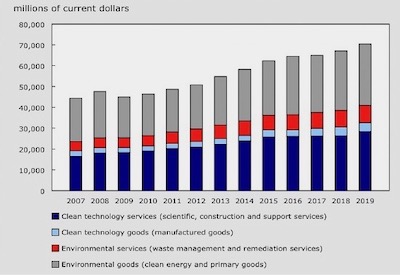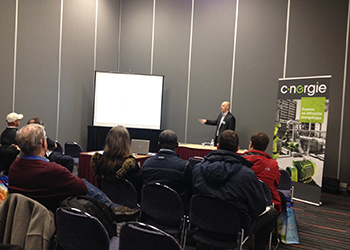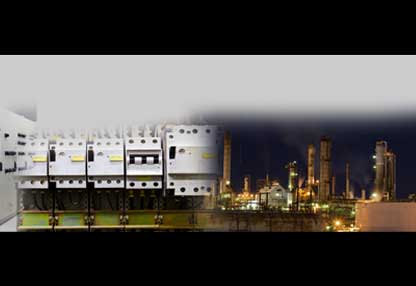Environmental and Clean Tech Products Sector Grew 2X the Pace of Economy in 2019

Dec 27, 2020
The gross domestic product (GDP) generated by the environmental and clean technology products sector grew 3.5% from 2018 to 2019 — twice the pace in real (volume) terms compared with the total Canadian economy (+1.6%).
In nominal terms, the value of the environmental and clean technology products sector in Canada reached $70.5 billion in 2019, accounting for 3.0% of Canadian GDP.
The share of environmental and clean technology products out of total GDP has remained relatively stable since the start of the time series in 2007. The share of the three top main contributors to the sector — the provinces of Ontario, Quebec and British Columbia — has also remained stable. In 2019, Ontario (36.1%) accounted for over one-third of the total value of environmental and clean technology products, while Quebec (28.6%) accounted for over one-quarter and British Columbia (14.4%) for one-seventh.
In 2019, just over half (53.7%) of the national GDP from environmental and clean technology products was attributable to the value of environmental goods and services. The remaining 46.3% of national GDP from the environmental and clean technology products sector was attributable to the production of clean technology goods and services.
The Environmental and Clean Technology Products Economic Account measures the contribution to the Canadian economy of goods and services that reduce environmental impacts. Two broad categories of goods and services are recognized: environmental goods and services (including clean electricity from renewable sources and nuclear power generation, biofuels and primary goods, and waste management and remediation services), and clean technology goods and services (including manufactured goods, scientific and research and development services, construction services, and support services). Examples of clean technology goods and services include solar panels and the design and construction of energy-efficient buildings.
Gains in the gross domestic product of the environmental and clean technology products sector driven by clean technology services
Overall, national GDP growth in the environmental and clean technology sector was driven by the clean technology services category. In particular, the growth reflected gains in the scientific and research and development services industry (+9.9%) as well as the construction services industries (+5.7%). The generation of clean electricity also contributed to the national increase, with its GDP growth of 3.3% over the period.
Most environmental and clean technology product exports and imports are manufactured goods
Volumes of environmental and clean technology product exports decreased 1.3% from 2018 to 2019. In nominal terms, the value of these exports totaled $13.5 billion in 2019, amounting to 2.0% of total Canadian exports. By way of comparison, natural gas products exports accounted for 1.6% of total exports that same year.
In 2019, more than three-quarters (78.8%) of all environmental and clean technology product exports were clean technology products (mostly manufactured goods). Clean electricity exports accounted for 15.1% of environmental and clean technology products exported.
National import volumes of environmental and clean technology products edged down 0.7% in 2019, after increasing 16.0% in 2018. The total value of Canadian environmental and clean technology product imports (in nominal terms) accounted for 2.9% or $19.9 billion of total Canadian imports in 2019.
Clean technology products (mostly complex manufactured goods) accounted for over four-fifths of that total at $16.2 billion.
Employment and salaries increase
An estimated 341,000 jobs were attributable to total environmental and clean technology activity in 2019, up 4.6% from a year earlier and accounting for 1.8% of all jobs in Canada.
The utilities sector was the largest industry group, accounting for over one-fifth (22.0%) or 74,800 environmental and clean technology jobs in 2019. These jobs were predominately found in electric power generation, transmission and distribution.
This was followed closely by the engineering construction industry at 64,400 jobs, or 18.9% of environmental and clean technology jobs. Three-fifths (60.2%) of these jobs were in electric power engineering.
Professional, scientific and technical services industry employed 52,100 (15.3%) and the administrative and support, waste management and remediation service sector employed 49,400 (14.5%), most of which were concentrated in waste management and remediation services. The manufacturing sector employed 40,300 (11.8%).
Ontario (39.3%), Quebec (24.5%) and British Columbia (12.0%) continued to employ the majority of environmental and clean technology sector workers in 2019.
The national average annual compensation per environmental and clean technology job, including benefits, rose 1.9% from a year earlier to $89,100 in 2019 compared with an economy-wide average of $63,200 (up 2.3% from 2018).
Source: Statistics Canada, www150.statcan.gc.ca/n1/daily-quotidien/201218/dq201218d-eng.htm











